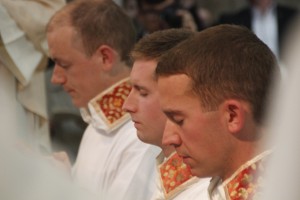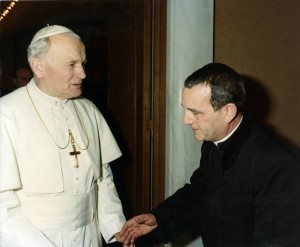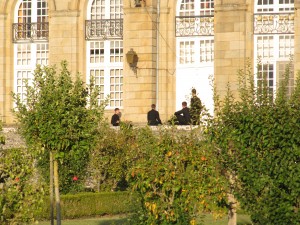Life at the seminary: a monotonous life?
Live the priestly formation in peace
In the eyes of the world, the life at a seminary, like in any convent or monastery, might at a first glance seem monotonous, or for some even boring. Is it possible to live truly happily a rhythmic life regulated by prayer, intellectual and manual work? Does this regularity, this “monotony” that accompanies a withdrawal from the world really prepare the pastors that the Church and the world need? Why voluntarily create such a gap between the world and the life of the seminary?
Contemplative life
This “flight from the world” that characterizes the contemplative life justifies in itself this change of life. The ordinary life, punctuated by prayer and work, such as St. Benedict thought, gives a frame in which the monk may seek God. Life is only monotonous on the surface. Thinking that one can only be bored in such a lifestyle, that is missing the essential. God is alive. It is in every moment, every day that God loves and speaks to each one. Being the soul of the contemplative life, it is the prayer that gives life all its meaning. From then on, it is in the ordinary of a monotonous and regular life that the monk experiences the extraordinary. This love that he receives, he shares it afterwards with his brothers in the most simple gestures, services and attentions. Thérèse of the Child Jesus describes perfectly this life apparently boring, or even “mortified”, and in reality, beautiful and demanding.
In fact, in order to succeed to live more by charity, that is to say of the life of the Holy Spirit, it is necessary to pass by a life that promotes the life of the soul. It is by adopting a lifestyle which balances the body, the affects and the sentiments that the soul can open itself, breath and give life its meaning.
A little page of history
Quite naturally, when the seminaries were created in the 17th century, the big founders, like St. Vincent de Paul, M. Olier or St. Jean Eudes drew from the big religious and monastic tradition in order to find the pedagogical foundation principles of the formation of pastors. A priest must first of all be a man of God, that is to say a friend of Christ, living by the Holy Spirit for the glory of the Father. It was thus necessary to give to the seminarians the means to encounter God.
The “momentary separation from the world” and the regular and rhythmic life appeared as essential principles in order to promote the emergence of an interior life.
And today
Even if the conditions have changed and the world has developed, there is something intangible that stays in the being of the priest. He is invited to represent Christ, to life by Christ and for Christ. The learning of the life with Christ requires an interior life that only a certain life style permits. Perhaps even more today than yesterday. The silence, the calm, the regularity, the time, the asceticism, so many aspects that the world partially flees from even though they are essential for the soul to open itself in order to live in God. The life in community then permits to verify and to develop the quality and effectivity of this interior life where the seminarian learns to live even more of the double commandment to love God and the neighbour. It is the great adventure of holiness. It is demanding. The coherence that the faithful expect from their pastor demands him to be on the route.
In reality, the apparent “monotony” of the life at the seminary hides the essential even though there are strong signs that every visitor may note: the peace, the joy and the attention of others. These attitudes unveil the charity that every seminarian tries to live even more every day in the prayer, the intellectual and the manual work.
The flights of the reality and oneself are more difficult in this kind of life. The regularity and the permanence of the relations sharpen the knowledge of self and of the others. The truth about oneself leads one to love oneself more justly. The love of the other becomes more just as well. There are still many other things that one could say about this life style, deliberately out of step with the world.
Furthermore, it seems like the future pastors that leave this life do not have too many difficulties to afterwards assume their place in the Church and the world. Having acquired the docility to the Spirit in order to represent Christ, the priest can adapt himself to the situations he is confronted with. He carries as well to the world something that he has experienced in the silence and the calm: the life in God.
Isn’t it that which one has to give to men?





